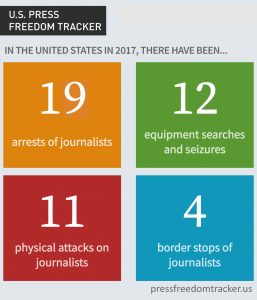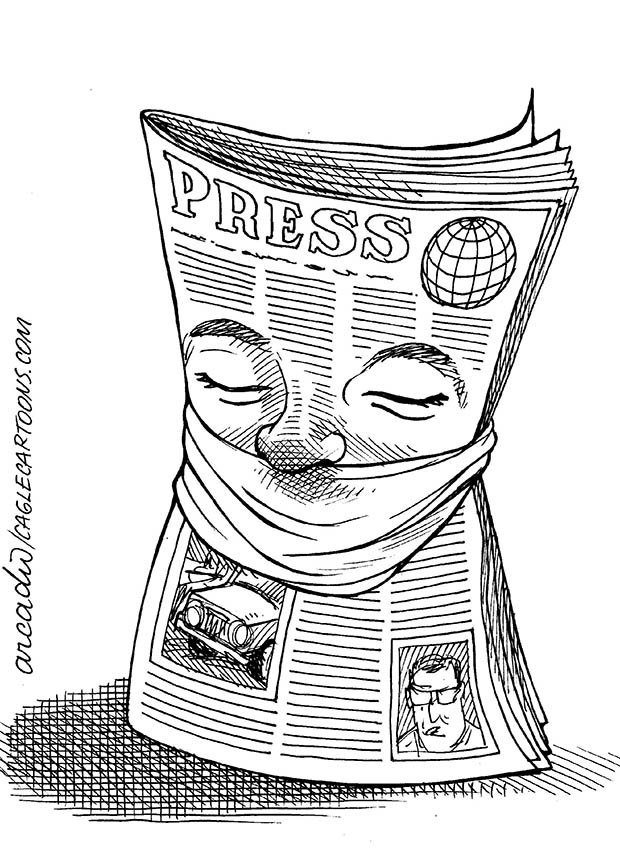2 Aug 2017 | Campaigns, Campaigns -- Featured, Media Freedom, media freedom featured
[vc_row][vc_column][vc_column_text]

US Press Freedom Tracker
Index on Censorship joined more than 20 press freedom organisations announcing the launch today of the U.S. Press Freedom Tracker, a new nonpartisan website dedicated to documenting press freedom abuses across the United States.
In recent months, journalists have been charged with crimes while covering protests in Washington D.C. and North Dakota; stopped at the border and subjected to searches of their electronic devices; and physically assaulted, in one case by a congressional candidate. Data collected on the U.S. Press Freedom Tracker shows that 19 journalists have been arrested in the course of their work in 2017 and that at least 10 reporters are currently facing charges. In 2017 at least four journalists have been stopped at the border and 11 have faced physical attacks, according to the tracker. These numbers may increase as we receive new information.
“While the focus has been on the Trump administration’s relationship with the press, American journalists have encountered more widespread obstacles to reporting — from violent protesters to police harassment — across the country as we detailed in our US report, researched and compiled with the methodology we developed for Mapping Media Freedom, our three-year-old database monitoring press freedom violations in 42 European area countries,” Melody Patry, head of advocacy at Index on Censorship, said.
“The United States has some of the strongest legal protections for press freedom in the world and a robust and varied media landscape, but this cannot be taken for granted. Open hostility, threats of leak prosecutions, and arrests have created a precarious situation for journalists,” said Alex Ellerbeck, senior research associate for the U.S. at the Committee to Protect Journalists and chair of the steering committee for the U.S. Press Freedom Tracker. “A full and honest accounting of challenges to press freedom in this country is sorely needed.”
The U.S. Press Freedom Tracker collects data based on news reports and tips submitted by journalists, professional organisations, and press freedom organisations. The coalition behind the tracker will use the research in letters, legal briefs, and advocacy campaigns.
“With the Trump administration ramping up its war on journalism, this initiative could not come at a more important time,” said Trevor Timm, executive director of the Freedom of the Press Foundation. “We hope it will be vital to highlighting the threats to press freedom in the U.S. and the important work journalists do to hold the government accountable.”
About the U.S. Press Freedom Tracker
Led by the Committee to Protect Journalists and Freedom of the Press Foundation, the site will serve as a central repository for data at a time when journalists in the U.S. are facing increased hostility. Freedom of the Press Foundation is leading the day-to-day operations of the U.S. Press Freedom Tracker, with its senior reporter, Peter Sterne, serving as the managing editor. The Committee to Protect Journalists is providing the initial funding and chairing the steering committee. The steering committee also includes representatives from the Reporters Committee for Freedom of the Press, the Knight Institute at Columbia University, Reporters Without Borders and Index on Censorship. A full list of partners is on the website.[/vc_column_text][/vc_column][/vc_row][vc_row][vc_column][vc_basic_grid post_type=”post” max_items=”12″ style=”load-more” items_per_page=”4″ element_width=”6″ grid_id=”vc_gid:1501680559388-7ab4706a-4916-9″ taxonomies=”8996″][/vc_column][/vc_row]
27 Jun 2017 | Mapping Media Freedom, News and features, Turkey
[vc_row][vc_column][vc_column_text]

Brothers Ahmet Altan and Mehmet Altan. Credit: CEFTUS
Throughout June, Index on Censorship’s Mapping Media Freedom project has recorded a number of violations in Turkey, which is now the biggest jailer of journalists in the world.
Turkish journalists charged with sending “subliminal messages”
The first hearing of the ongoing trial of Turkish journalists for involvement in last year’s coup took place on Monday 19 June. Political commentators and brothers Ahmet Altan and Mehmet Altan are accused of offences against Turkish President Recep Tayyip Erdogan and the Turkish government including “attempting to overthrow the Government of Turkey” and using “subliminal messaging” to encourage the coup.
The Altan brothers have been in pretrial detention for 11 months. Ahmet is a well-known journalist in Turkey and has worked as a reporter and editor at several newspapers. He has previously been charged with “denigrating Turkishness” after writing about the Armenian genocide. Mehmet is a professor at Istanbul University who has called on Turkey to improve its human rights record.
The hearing was delayed, and the judge spent several hours reading a long summary of the indictment, according to Index’s head of advocacy Melody Patry, who formed part of an international delegation of observers to the trial.
In his defence statement, Ahmet called the indictment against him “untruthful and nonsensical”. He described the charges and refuted them, explaining his lack of connection to instigating the coup. “I take you through all these things in such detail because I want everyone to see the recklessness with which this prosecutor and his like have darkened people’s lives, how they have abused their power,” he said. “I want all this to be documented for the day the law wakes up.”
Ahmet quoted portions of the indictment against him, including an excerpt in which he questioned the case of Can Dundar, another Turkish journalist who was convicted of espionage for publishing evidence of Turkey sending arms to Syria. Ahmet maintains that Turkish people had a right to know about these events. “Perhaps the prosecutor is giving a not at all ‘subliminal’ message to Turkey that whoever defends the rule of law will be thrown in jail,” he said.
According to Patry, this case is significant because of the potential three life sentences the journalists face as the first instance of journalists prosecuted for being complicit in the coup.
On 1 June, Turkish police detained eight people for using the chat software ByLock, the software the authorities in Turkey suspect was used by the group that plotted the 15 July coup attempt.
Former regional bureau chief of the Cihan news agency, referred to only as KA in news reports, was among those arrested.
İlker Yücel, the editor-in-chief of Aydınlık newspaper, was taken into custody and arrested on 2 June. The arrest was related to a 2014 story in Aydınlık which was found insulting to Berat Albayrak, Turkey’s Energy Minister and the son-in-law of President Recep Tayyip Erdoğan. The newspaper failed to print a correction or pay a TL 100,000 fine,
He was released on 4 June.
A court received an indictment for two consecutive life sentences without the possibility of parole for 13 journalists on 6 June. The charge from Istanbul’s Chief Prosecutor lists Gökçe Fırat Çulhaoğlu, Yakup Çetin, Bünyamin Köseli, Cihan Acar, Abdullah Kılıç, Oğuz Usluer, Atilla Taş, Hüseyin Aydın, Murat Aksoy, Mustafa Erkan, Seyit Kılıç, Yetkin Yıldız and Ali Akkuş as suspects.
The 13 journalists are charged with “attempting to overthrow the constitutional order” and “attempting to overthrow the government of the Republic of Turkey,” in connection with the 15 July coup attempt. They previously stood trial for “membership of a terrorist organisation” but were released 31 March. All but one of them were rearrested on the new charges.
The managing editor of the newspaper Evrensel, Çağrı Sarı, and former copyrights owner of the newspaper Arif Koşar each received five-month prison sentences on 6 June. They were convicted of “Denigrating the Turkish Nation, the State of the Republic of Turkey, the Agencies and Institutions of the State.” The charges were regarding a story published in Evrensel on Nusaybin.[/vc_column_text][/vc_column][/vc_row][vc_row][vc_column][vc_column_text]
Mapping Media Freedom
Click on the bubbles to view reports or double-click to zoom in on specific regions. The full site can be accessed at https://mappingmediafreedom.org/[/vc_column_text][/vc_column][/vc_row][vc_row][vc_column][vc_single_image image=”91878″][/vc_column][/vc_row]
23 Jun 2017 | Event Reports, Mapping Media Freedom, News and features
[vc_row][vc_column][vc_video link=”https://www.youtube.com/watch?v=IiBVfpI05Z0″][vc_column_text]Index on Censorship officially launched its Mapping Media Freedom platform at the London residence of Swedish Ambassador Torbjörn Sohlström on Wednesday 22 June.
Mapping Media Freedom is a database tracking threats and violations against press freedom across 42 European countries. The data is mapped to help raise awareness of the pressure journalists face as they do their jobs and help officials to take action to protect press freedom across Europe.
The event attracted journalists and internet rights activists to representatives from organisations devoted to freedom of expression, who were welcomed to the launch by Sohlström had received a special invitation from the ambassador.
Melody Patry, Index on Censorship’s head of advocacy, introduced the MMF tool and reminded the audience of why this project is necessary. She quizzed the audience on headlines mapped during the last month, asking them to guess which country offences took place in. Patry said that these offences take place throughout Europe, not just in countries with authoritarian governments. “It’s a way of highlighting problems, it’s a way of bringing people into the conversation,” Ambassador Sohlström said about the new tool.
Chair of Index on Censorship and Times columnist David Aaronovitch, who participated in a panel discussion with fellow journalists, former head of Swedish Pen Ola Larsmo and Director of BBC World Service Group Francesca Unsworth, said that the media are facing a crisis of authority. “Both everybody and nobody can be believed.” According to Aaronovitch, this state of authority crisis tends to create a demand for new forms of censorship and problems journalists.
The journalists participated in a discussion, chaired by Index on Censorship CEO Jodie Ginsberg, that examined threats against journalists, hate speech and internet censorship. Unsworth suggested that the world is becoming more authoritarian regarding free speech rights, while Larsmo added that rights were generally moving in a “three steps forward, two steps back,” pattern, and we are living in a moment of retreat.
“People crave the kind of impartial journalism offered by mainstream media,” Unsworth said, noting that there is still a role for journalists.
Larsmo emphasised that common people should understand that their freedom is linked to freedom of the press and freedom of expression.
With thanks to Edwardian Hotels London[/vc_column_text][/vc_column][/vc_row][vc_row][vc_column][vc_basic_grid post_type=”post” max_items=”12″ style=”load-more” items_per_page=”4″ element_width=”6″ grid_id=”vc_gid:1498211658950-6ccf6854-da7e-3″ taxonomies=”6564″][/vc_column][/vc_row]
31 May 2016 | Events, Middle East and North Africa

The New Arab news network invites you to a panel discussion to discuss the challenges faced by the media and journalists in the post-Arab Spring era. The Arab Spring of 2011 presented hope for a region free from dictatorial rule and media constraints, but since the people’s uprising, much the opposite has happened. The Arab world is still plagued by media censorship, and independent journalism and objective coverage can be a life-threatening exercise.
The Arab Spring of 2011 presented hope for a region free from dictatorial rule and media constraints, but since the people’s uprising, much the opposite has happened. The Arab world is still plagued by media censorship, and independent journalism and objective coverage can be a life-threatening exercise.This discussion will explore the current state of the media in the region and the future of press freedom in the wider Arab world.
This discussion will explore the current state of the media in the region and the future of press freedom in the wider Arab world.
Hosted and Chaired by SNP MP Tommy Sheppard.
Speakers Include:
– Faitma El-Issawi, research fellow, LSE Middle East Centre
– Melody Patry, advocacy officer at Index on Censorship
– Abdu Elshayyal, CEO of The New Arab
When: Wednesday, 15 June 2016 from 5.30-7pm
Where: Conference Room 15, House of Commons, London, SW1A 0AA (view map)
Tickets: Free, but registration is required.


